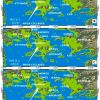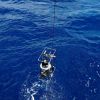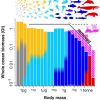-
 +15 +1
+15 +1Ancient Humans May Have Sailed The Mediterranean 450,000 Years Ago
Archaic humans may have worked out how to sail across the sea to new lands as far back as nearly half a million years ago.
-
 +14 +1
+14 +1Tuna Have Been Seen Rubbing Themselves Against Sharks And We Don't Blame Them
Imagine you're a big yellowfin tuna, miles from shore out in the blue, swimming around carefree, until you start to feel a little itch near your eye.
-
 +4 +1
+4 +1Abandoned WWII Shipwreck Has Altered The Ocean's Microbiology For 80 Years
There's a certain romance and mystique associated with shipwrecks when seen as ancient artifacts hiding in the gloom.
-
 +13 +1
+13 +1The Ocean Should Have the Legal Right to Life to Combat Climate Change, Researchers Say
Earth’s global ocean should be considered a living entity with its own set of rights and protections, a paradigm shift that is informed by Indigenous worldviews and the burgeoning tradition of Earth law, according to a new article written by an interdisciplinary team of researchers.
-
 +7 +1
+7 +1Amount of ocean heat found to be accelerating and fuelling extreme weather events
The amount of heat accumulating in the ocean is accelerating and penetrating ever deeper, with widespread effects on extreme weather events and marine life, according to a new scientific review. One of the report’s authors said the devastating floods in eastern Australia had likely been made worse by warming oceans. The risks would continue to rise as the ocean took up more heat, the report said.
-
 +19 +1
+19 +1740,000km of fishing line and 14 billion hooks: we reveal just how much fishing gear is lost at sea each year
Each year, enough fishing line to circle the Earth 18 times is lost at sea. This not only harms marine life, but also the livelihoods of fishers worldwide.
-
 +18 +1
+18 +1An Anatomical Quirk Could Explain Why Whale Brains Aren't Pulverized When They Dive
Humans have concocted all sorts of equipment to help us overcome the intense water pressures of the ocean's depths.
-
 +3 +1
+3 +1‘Nowhere is free from noise’: deep-sea mining threat to marine mammals
Noise pollution from proposed deep-sea mining could radiate through the ocean for hundreds of kilometres, scientists predict, creating a “cylinder of sound” from the surface to the sea bed.
-
 +22 +1
+22 +1Can these plastic-gobbling inventions keep rubbish out of the ocean?
Millions of tonnes of plastic wind up in the ocean every year, killing plants and animals. That’s why companies around the world have developed novel devices to help reduce the ocean plastic problem.
-
 +10 +1
+10 +1When Shipping Containers Sink in the Drink
We’ve supersized our capacity to ship stuff across the seas. As our global supply chains grow, what can we gather from the junk that washes up on shore?
-
 +15 +1
+15 +1Electricity from the cold ocean depths could one day power island states
Island states are often dependent on expensive imported fossil fuels for their power. Ocean thermal energy conversion plants could provide constant power – if technical issues can be overcome.
-
 +28 +1
+28 +1Virologists Identify More Than 5,000 New Viruses in the Ocean
Virologists have identified 5,504 new virus species floating in ocean water samples. The viruses were found using a machine learning algorithm to study 35,000 water samples from all over the globe, reports Vishwam Sankaran for the Independent.
-
 +15 +1
+15 +1Deep-Sea Octopuses Are Making Shelters Out Of Human Trash
One man’s trash is an octopus’ treasure. A group of researchers from Italy and Brazil wanted to take a closer at how deep-sea octopuses interact with trash that makes its way to the ocean after being discarded by humans.
-
 +15 +1
+15 +1Fish Have 'Talked' For 155 Million Years, And Now You Can Hear Their 'Voices'
All manner of croaks, chirps, and deep trombone moans permeate Earth's waters, just like the cacophony of sounds that fill its forest air. For example, reefs are surprisingly noisy places, and many of the noisemakers are fish.
-
 +16 +1
+16 +1Scientists uncover 'missing' plastics deep in the ocean
About 51 trillion microplastics are floating in the surface waters of oceans around the world. Originating from various types of plastics, these tiny fragments (less than 5 millimeters in length) pollute natural ecosystems. Hundreds of studies have surveyed plastic debris on the surface or near surface of the ocean. However, these studies only "scratch the surface," and do not provide a complete inventory of what's lurking beneath.
-
 +19 +1
+19 +1World ocean temperatures in 2021 were the hottest ever recorded
A study ties the warming trend to human emissions of greenhouse gases from the burning of fossil fuels.
-
 +15 +1
+15 +1Tropical Fish Shoals Disrupted by Ocean Acidification and Warming
Researchers from the University of Adelaide have found that the way fish interact in groups is being upset by ocean acidification and global warming.
-
 +16 +1
+16 +1Discarded tires in the oceans are trapping hermit crabs, with no way out
Hermit crabs are finding their way into discarded tires in the ocean -- and they can't get out, a new study from Hirosaki University found. The concave interior of a car tire can trap hermit crabs that go there in search of food and shelter. The study refers to this phenomenon -- when marine animals get caught in human litter, such as fishing nets -- as "ghost fishing."
-
 +23 +1
+23 +1Humans Have Broken One of The Natural Power Laws Governing Earth's Oceans
Just as with planetary or molecular systems, mathematical laws can be found that accurately describe and allow for predictions in chaotically dynamic ecosystems too – at least, if we zoom out enough.
-
 +21 +1
+21 +1This Intrepid Robot Is the WALL-E of the Deep Sea
Here's how engineers got the car-sized Benthic Rover II to roam the seafloor 13,000 feet deep without immediately breaking down.
Submit a link
Start a discussion




















